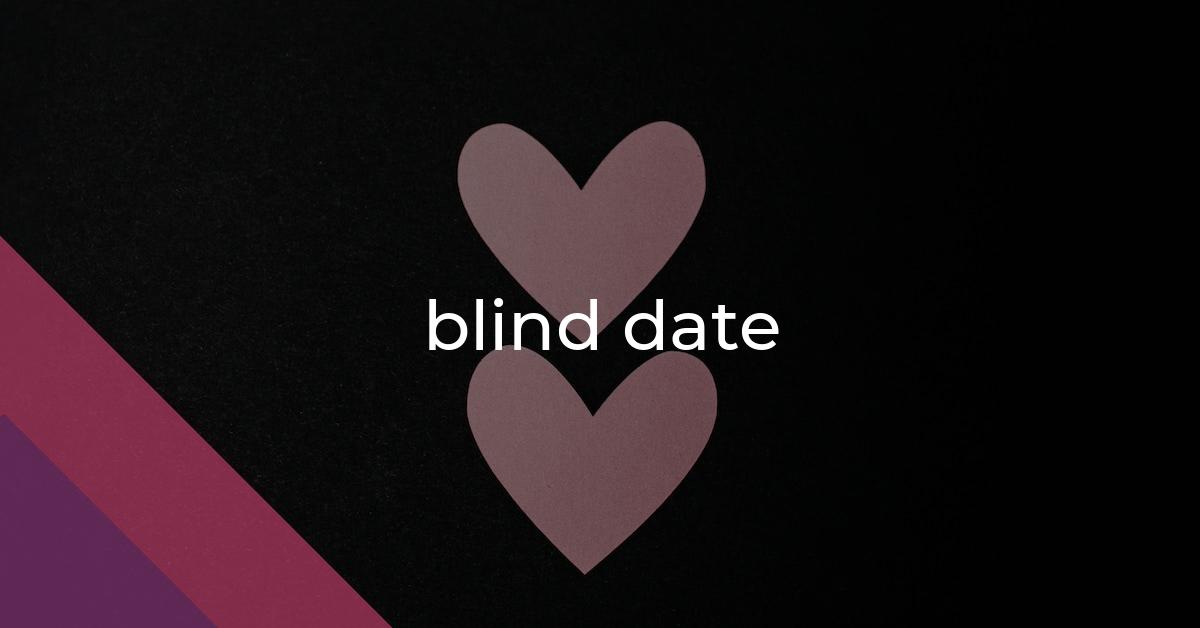blind date: Idiom Meaning and Origin
What does ‘blind date’ mean?
A "blind date" is a social encounter where two people meet for the first time without any prior knowledge or information about each other. It often refers to a romantic meeting set up by a mutual acquaintance or a dating app. The element of unknown or surprise is a key characteristic of a blind date.

Idiom Explorer
The idiom "sight unseen" means to make a judgment or decision without seeing or examining something or someone beforehand.
The idiom "fly blind" means to operate without clear information or guidance. It conveys the idea of taking action without being fully aware of the situation or its potential consequences.
An idiomatic expression, "date with destiny" suggests a significant and predestined encounter or event that will impact a person's future in a profound way.
The idiom "bump into" means to unexpectedly meet or encounter someone or something by chance or accident.
The idiom "blink-and-you-miss-it" means something that happens so quickly and briefly that if you are not paying close attention, you will completely miss it.
The idiom "blind with science" means being confused or overwhelmed by complex scientific information or jargon.
The idiom "blind leading the blind" refers to a situation where someone lacking knowledge or expertise is attempting to guide or instruct others who are similarly lacking in knowledge or expertise. This expression is often used to highlight the incompetence or futility of such a situation.
Analysis of the idiom "blank out":
"Blank out" means to forget or become unable to recall something due to a temporary loss of memory or concentration.
A "blanket term" is an expression used to encompass a wide range of things or concepts under a single name, without considering individual differences or details.
Unmasking Chance Encounters
The idiom "blind date" is a term used to describe a social engagement, usually a romantic one, where two people who have never met before are arranged to meet and interact. It is a situation where both participants have limited or no knowledge about each other's background or personality.
The exact origin of the idiom "blind date" is uncertain. Some sources suggest that it first appeared in mid-20th century American English. The term is believed to have derived from the idea of blindness as a metaphor for lack of knowledge or information. In the context of a blind date, the participants are "blind" to each other's characteristics and personalities.
A blind date is often set up by a mutual acquaintance, such as a friend or family member, who believes that the two individuals would be compatible or have potential for a romantic relationship. The purpose of arranging a blind date is to provide an opportunity for the participants to meet and get to know each other without any preconceived notions or expectations.
Blind dates can be both exciting and nerve-wracking experiences. Since the participants have no prior knowledge about each other, they approach the encounter with a sense of anticipation and curiosity. The outcome of a blind date can vary greatly, ranging from a positive connection and the beginning of a meaningful relationship to a complete lack of chemistry and an awkward or uncomfortable encounter.
The idiom "blind date" has become deeply ingrained in popular culture and is frequently seen in movies, television shows, and literature. It is often used to depict situations that involve uncertainty or the unknown, extending beyond the realm of dating. The idea of going into a situation "blind," with limited or no information, resonates with many people and has become a metaphor for various aspects of life.
An idiom related to "blind date" is "sight unseen." This expression is often used to describe situations where something or someone is not seen before making a judgment or decision. In the context of a blind date, the participants are meeting each other "sight unseen," without any knowledge or prior interaction. This adds to the anticipation and intrigue surrounding the encounter.
Another related idiom is "fly blind." This phrase is used to describe acting or proceeding without any clear plan or guidance. When two individuals go on a blind date, they are essentially "flying blind" as they navigate the interaction without any prior knowledge or expectations. They must rely on their instincts and the unfolding conversation to determine the course of the date.
The idiom "blind date" refers to a social engagement where two people who have never met before are introduced with limited or no knowledge about each other. Its exact origin is uncertain, but it has become a commonly used phrase in American English to convey the idea of entering a situation without any prior information. Blind dates can be both exciting and nerve-wracking, with a wide range of possible outcomes. The idiom has also become a metaphor for situations beyond dating, resonating with the concept of uncertainty and the unknown. The related idioms "sight unseen" and "fly blind" further highlight the unique nature of blind dates.
Example usage
Examples of how the idiom *blind date* can be used in a sentence:
- He agreed to go on a blind date set up by his friends.
- I had a terrible blind date last night; we had nothing in common.
- She was nervous before meeting her blind date for the first time.
More "Dating" idioms



